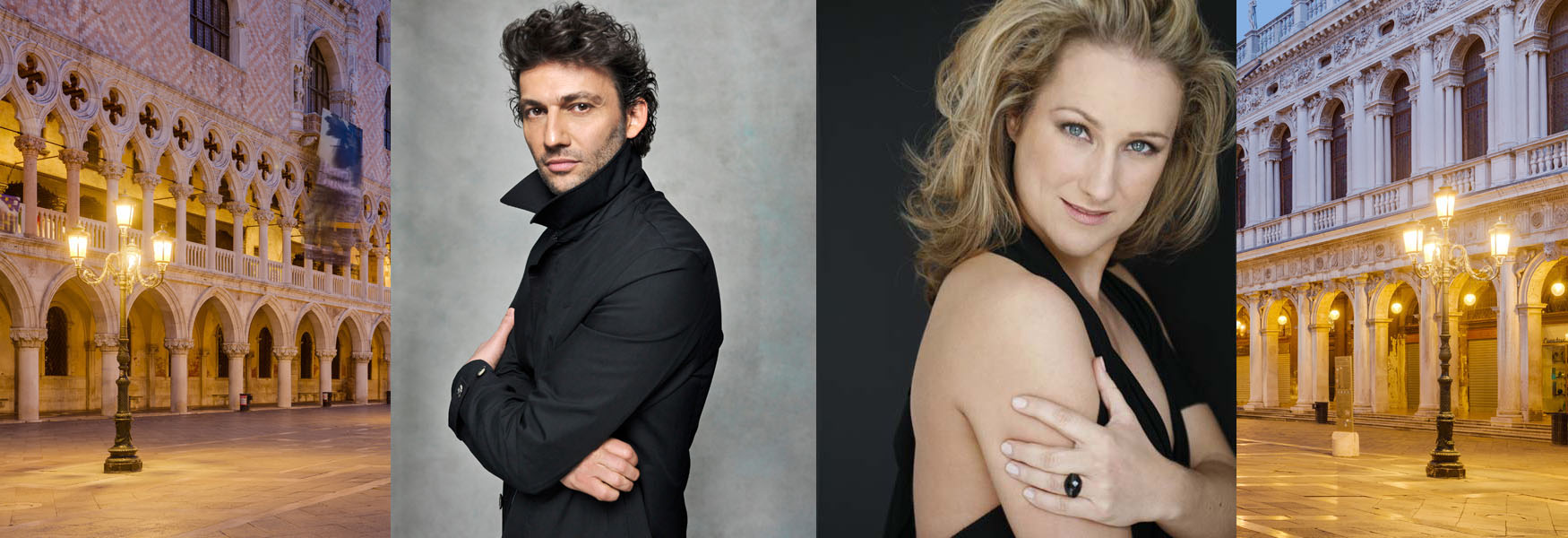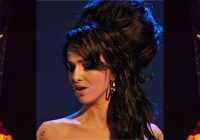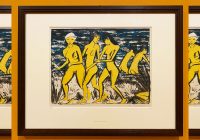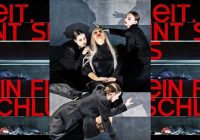Italienisches Liederbuch mit Jonas Kaufmann
Von Karin Jacobs
5.2.2018
English Text below
Ein Liebesreigen auf Weltklasseniveau – Eindrücke vom Tourneestart in Baden-Baden
Jonas Kaufmann ist auf großer Europa-Tournee: Zusammen mit der Sopranistin Diana Damrau und Helmut Deutsch am Klavier zeigt er ein Bravour-Stück höchster Liedkunst, das die meisten Zuhörer überraschen wird. Das „Italienische Liederbuch“ von Hugo Wolf hat mit schmetternder Italianitá gar nichts und mit den bekannten Liederprogrammen von Schubert bis Strauss nur wenig zu tun. Für die Künstler bedeutet der Abend die herausfordernde Aufgabe, die weithin unbekannte Liedersammlung für das Publikum mit Spannung zu füllen, denn leicht hat es der Komponist ihnen und den Zuhörern nicht gemacht. Natürlich geht es um die Liebe, doch in zartester Miniaturform und gerade darin besteht der Reiz dieses Abends mit 46 kleinen, teils kleinsten Liebesliedern in Dialogform, von denen jedes einzelne ein feingeschliffener Diamant ist, der an das rechte Licht gehalten werden will. Von Paul Heyse aus dem Italienischen ins Deutsche übertragen und von den Künstlern dramaturgisch sinnvoll zusammengestellt , zeigt er einen Reigen der unterschiedlichsten Gefühle. Sie lieben sich heiß, necken sich zärtlich, streiten sich temperamentvoll, versöhnen sich sanft, nehmen Abschied und finden sich wieder – und der Reigen beginnt aufs Neue.
Man könnte meinen, es mit einer leicht süßlichen Angelegenheit zu tun zu haben, doch davor steht der Meister Hugo Wolf und davor stehen die Künstler, die auch nicht den geringsten Anklang an kitschige Herz-Schmerz-Romantik zulassen. So federleicht die Lieder daher zu kommen scheinen, so sehr fordern sie doch die vollkommene Aufmerksamkeit des Publikums, denn die Feinheiten der sängerischen Kabinettstückchen liegen im Verborgenen und wollen entdeckt werden. In Zeiten, in denen die Zukunft von Liederabenden diskutiert wird und die Plattenlabels nicht mehr auf diese Gattung setzen, braucht es Mut, um mit diesem außergewöhnlichen Programm eine lange Tournee zu bestreiten. Und es braucht ein musikalisches und sängerisches Können der Extraklasse. Beides stellen die Künstler hier unter Beweis.
Jonas Kaufmann führt den emotionalen Bogen an, obwohl Diana Damrau, deren erfrischender Sopran mit jugendlichem Schmelz und natürlicher Farbigkeit, an einigen Stellen auch mit den ganz großen Tönen fasziniert, das erste und das letzte Wort hat. Doch er ist es, der auf ihre naive Anmache, auf ihr mädchenhaftes Zögern, auf ihre launischen Neckereien mit den großen Gefühlen antwortet. Der kongeniale Partner am Klavier, Helmut Deutsch, trägt die beiden Liebenden mit musikalisch sensiblen Händen durch die Höhen und Tiefen der Gefühle. Gut, dass die leisen , fast durchgehend zwischen Piano und Mezzoforte wechselnden und für den Tenor-Part in der mittleren Stimmlage gehaltenen Klänge nicht eins zu eins vorgesungen, sondern oft durch witzige , mimische und gestische Kommentare der Sänger begleitet werden. Die ironische Brechung verhindert zwar manchmal, dass die Emotionen im Publikum nachempfunden werden können, dafür aber begeistert das perfekte Zusammenspiel der Drei und die Souveränität der Sänger in jedem Augenblick. Für Jonas Kaufmann, dessen
Kennzeichen die emotionale Tiefe seiner Liedinterpretationen ist und dessen Stimme sich gerade in den hohen Tönen durch ihre Strahlkraft auszeichnet, ist dieses so ganz und gar andere Herangehen an Poesie und Musik eine besonders bemerkenswerte Leistung. Je feiner ihm die humorvolle Distanzierung gelingt und je zurückhaltender er in einigen Liedern die ungebrochenen Gefühle vermittelt, desto deutlicher wird seine Begabung, ein Lied auf seinen Sinngehalt hin zu interpretieren. Dafür zieht er stimmlich all jene Register, die auf der Opernbühne wenig gefragt sind: Im Fokus steht nicht die Präsentation seiner Stimmschönheit, obwohl sie gerade hier oft durchleuchtet, sondern der Ausdruck der Gedanken und Emotionen. Damit zeigt er eine Gesangskultur der Sonderklasse, die mit Gestaltungskraft, Präsenz und Ausstrahlung punktet. Mit so viel Können und Mut lässt dieser Abend aufhorchen und darauf hoffen, dass die Entdeckungsreisen durch die Welt der unbekannten Liedschätze weiter gehen. Am besten natürlich mit Künstlern dieses Weltklasse-Formats!
Nächste Termine: Berlin am 6. Febr., Hamburg am 8. Febr. und den Schluss macht nach drei Wochen Barcelona am 24. 2.2018
A love tour on a world class level
Impressions from the tour start by Karin Jacobs-Zander
Jonas Kaufmann is on a major European tour: Together with the soprano Diana Damrau and Helmut Deutsch on the piano, he shows a bravura piece of the highest song art, which will surprise most listeners. The „Italian Songbook“ by Hugo Wolf
has nothing to do with blaring Italianitá and little to do with the well-known song programs from Schubert to Strauss. For the artists, the evening is the challenging task of filling the widely unknown collection of songs with excitement for the audience, because the composer did not easily make them and their listeners. Of course it’s all about love, but in the most delicate miniature form, and especially in this, the charm of this evening with 46 small, sometimes the smallest love songs in dialogue form, each of which is a finely honed diamond that wants to be held in the right light. Translated from Italian into German by Paul Heyse and compiled in a dramaturgically sensible way by the artists, he shows a range of different emotions. They love each other hot, they tease each other tenderly, argue spiritedly, reconcile themselves softly, say goodbye and find each other again – and the dance begins anew.
One might think that it has something to do with a slightly sweet affair, but in front of it is the master Hugo Wolf, and in front of it are the artists who do not allow the slightest hint of kitschy heart-pain romance. As featherlight as the songs seem to come, they demand so much the complete attention of the audience, because the subtleties of the singers Cabinet pieces lie hidden and want to be discovered. In times when the future of recitals is being discussed and the record labels are no longer counting on this genre, it takes courage to go on a long tour with this extraordinary program (Berlin on the 6th of February, Hamburg on the 8th of February and the end is over) three weeks Barcelona on 24. 2.) to deny. And it needs a musical and singing skills of the extra class. Both prove the artists here.
Jonas Kaufmann leads the emotional arena, although Diana Damrau, whose refreshing soprano with its youthful enamel and natural color, in some places also fascinates with the very large tones, has the first and the last word. But it is he who responds to her naive approach, to her girlish hesitation, to her capricious teasing with the great emotions. The congenial partner on the piano, Helmut Deutsch, carries the two lovers through musically sensitive hands through the ups and downs of their emotions. It’s a good thing that the soft, almost continuous between piano and mezzoforte changing and held for the tenor part in the middle vocal range sounds not sung one-to-one, but often accompanied by funny, mimic and gestural comments of the singers. Although the ironic refraction sometimes prevents the emotions in the audience can be modeled, but excited the perfect interaction of the three and the sovereignty of the singer in every moment. For Jonas Kaufmann, whose
Characteristic of the emotional depth of his lied interpretations and whose voice is characterized by its charisma especially in the high tones, this very different approach to poetry and music is a particularly remarkable achievement. The finer the humorous distancing and the more restrained he conveys the unbroken feelings in some songs, the clearer his gift of interpreting a song becomes in terms of its meaning. For this he vocally pulls all the stops that are in little demand on the opera stage: the focus is not the presentation of his vocal beauty, although she often shines through here, but the expression of thoughts and emotions. He shows a singing culture of the special class, which scores with creativity, presence and charisma. With so much skill and courage, this evening makes you sit up and hope that the voyages of discovery through the world of unknown songs will continue. Best of course with artists of this world-class format!
Author: Karin Jacobs-Zander
Karin Jacobs-Zander, Dramaturgin und Autorin der Bücher „Lebenslotsen“ und „Wo München am schönsten ist“ aus dem Ellert & Richter Verlag, lebt in München als freie Journalistin












